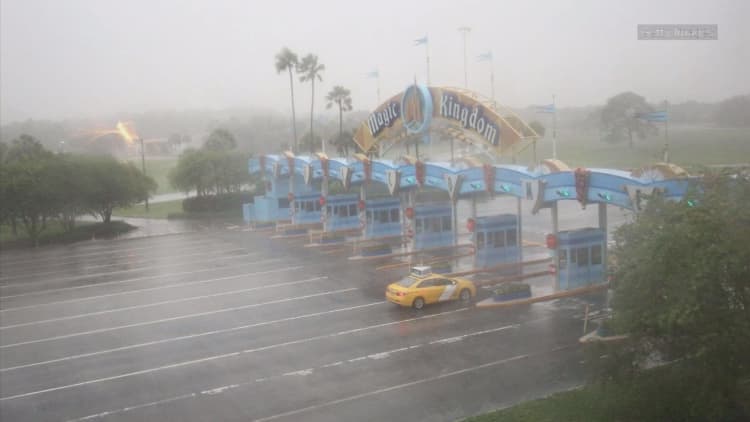In the wake of Hurricane Irma, Florida residents — or at least those who stuck around — are left scrounging for the items they need most, mainly food and water.
While the Federal Emergency Management Agency is prepared to get some supplies to the storm's survivors, it will take time for distribution to begin, with roads still closed and curfews in place. Not even a month ago, FEMA nearly ran out of money after Hurricane Harvey hit Texas. But Congress has since signed off on another $15 billion in emergency funding.
In search of essentials, Florida's residents — nearly 6 million of them without electricity — are waiting to learn when, or if, their local supermarkets will be able to reopen.
The grocers with the biggest presence in Florida include Publix — which is privately held and headquartered in the state — Wal-Mart, Costco, Winn-Dixie and BJ's Wholesale.
Amazon-owned Whole Foods, which also has a presence in Florida, tweeted out a list of closed locations across the state.
"The problem becomes you have grocery retailers with a mix of stores ... some are heavily damaged, and other stores didn't suffer any damage but are completely clean of product from their shelves," Brittain Ladd, a strategy consultant who worked on global expansion for AmazonFresh, told CNBC in an interview.
"Natural disasters upset the equilibrium within the grocers' supply chain," Ladd continued. A storm like Hurricane Irma caused a "rush" of shopping at the onset, followed by a period of retailers' reassessment and figuring out which stores will need inventory most in the aftermath, and how they're going to get it, he said.
Getting fresh groceries back to stores is a top priority for many retailers. But in the downtime and without power, many are helping out, with their boots on the ground, as much as they can.
Wal-Mart, for example, has plans to deliver 1,700 truckloads of essential supplies to the state. Target has said that when its facilities reopen, teams will push products to affected stores, including some trailers that were loaded before the hurricane hit.
Refrigerated products — milk, yogurt, eggs and meats — will take more time to restock.
"Everybody is trying to mobilize and reopen but you can only do so much, and frankly Irma is still blowing," Lee Arnold, executive chairman of Colliers International in Florida, told CNBC in an interview. By Monday morning, Arnold had safely vacated the state and was settled in Atlanta, waiting for the storm to subside and communicating with his emergency-response colleagues further south.
Florida was much better prepared with Irma, Arnold said. Following Hurricane Charlie in 2004 and an "era" of similar catastrophes, more gas stations and Publix stores were equipped with generators, ready for this type of storm, he said.
Right now, still in the early stages of surveying Irma's destruction, Colliers hasn't been able to determine the exact impact on the real estate market. But rebuilding will take time and money, Arnold emphasized.
"We have practiced the art of coming back and helping our citizens," he said.
Publix, with a massive presence in its home state, is maintaining a running list of store closures on its website and has promised to reopen "ASAP."
One of the biggest issues with Hurricane Irma, which both Ladd and Arnold pointed to, was the storm's last-minute turn to the west.
"Retailers really don't have the ability to pivot when a disaster does something unexpectedly," Ladd said. "Now, instead of automatically replenishing stores, they have to do it manually."
Southeastern Grocers, the owner of Bi-Lo, Winn-Dixe and Harveys Supermarkets stores, is another retailer seeing a substantial impact from Irma.
"We've had roofs come off, we've had serious damage," Anthony Hucker, the CEO of Southeastern Grocers, told CNBC's "Power Lunch" Monday afternoon, from his company's headquarters in Jacksonville. He added, though, that despite the damage he thinks the longest it might take to reopen a shop would be six months.
There's nothing that's beyond repair, at least for Southeastern, Hucker told CNBC.
WATCH: Irma threatens Florida's tourism industry

CORRECTION: This story has been updated to reflect that there are no Food Lion stores in Florida, as was previously reported.


